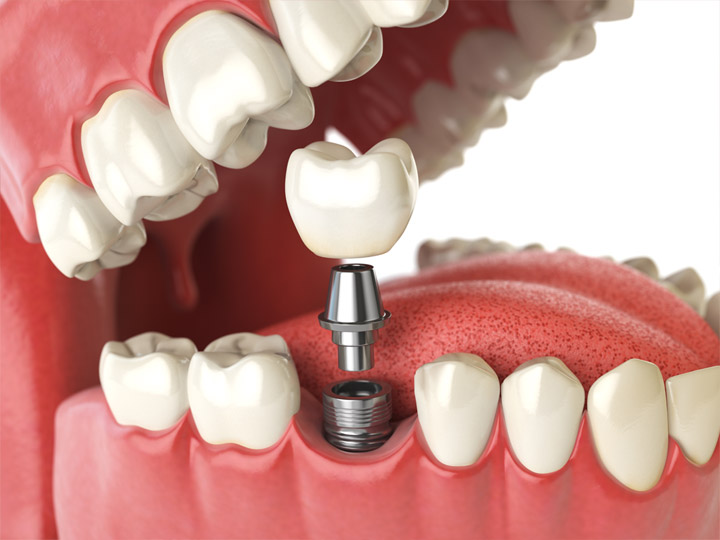Dental implants are becoming more common, with patients opting to have a permanent solution to missing teeth. Dental implants suit a wide-range of patients but are they right for you? Here, we explore the use of dental implants in more detail so you can make a decision that’s right for your specific circumstances:

What Are Dental Implants?
Implants are unlike removable dentures because, as their name suggests, they are implanted or fixed into the jawbone. Teeth have roots that reach deep down into the gum and with dental implants, this is replicated with a titanium post. The post is surgically positioned and fixed into the jawbone beneath the gum line. Onto this post, your dentist will fix a tooth or teeth replacement or a bridge.
When Are Dental Implants Used?
Implants are used to replace a tooth or teeth that are missing due to extraction or because of a trauma to the face. There are times when they are also used to replace teeth that have rotted, but your dentist will be keen to ensure that you have good oral health before carrying out any treatment. This means looking after your teeth and gums so that you get the most out of your dental implants. Many patients are choosing to go for implants rather than dentures as they may not like the idea of removing a plate or false teeth from their mouth daily. Dental implants also look realistic and thus, no one notices that you have them. In most cases, you can eat the same foods and drinks, but there are some changes you will need to make to keep your porcelain or ceramic dental implants looking good.
Largely, patients in good health are considered prime candidates for implants to replace missing teeth. Essentially, you would undergo surgery to have the posts fitted and this means there will be some recovery time. If you are in good health, your mouth and gums will heal quicker and better.
How Dental Implants Are Fitted
It is important to note that this is a surgical procedure that will vary from one patient to another as it is dependent on factors that are personal to patients. Thus, your dentist will plan carefully what needs to be achieved and how best to do this for you. Dental implants need to fit properly and they must be placed in a way that would not harm existing nerves. Your specialist will take pictures of your face and jaw, as well as several x-rays and possibly a CT scan on your jaw line too. Some dental practices also have 3D imaging processes that allow them to accurately see your skull, jawline and sinuses. This helps them to visualise where and how best to place your implants.
Dental practices will do things in different ways but as a general overview, this is how implants can be fixed;
The first surgery involves implanting the titanium rods into your jaw. You may also be fitted with a temporary bridge. You may experience some discomfort but the process shouldn’t be too extreme.
It will take some time for your gums to recover which is why the second surgery may be several months on from the implanting of the rods. There are somethings you need to do to ensure a speedy recovery and your expert implant dentist in Dublin will advise you further.
The second surgery involves making a small cut in the gum to remove the protective cap from the implant, replacing it with a ‘healing cap’.
The third stage, which happens two or three weeks after this, is where the process of building a bridge, denture or crown will begin.
Looking After Dental Implants
For anyone considering dental implants, you need to be aware that it is essential your oral hygiene routine is of the highest standard.
But, there is no doubt that dental implants can make a dramatic difference to your life. Why not take a closer look to see if they are suitable for you?
